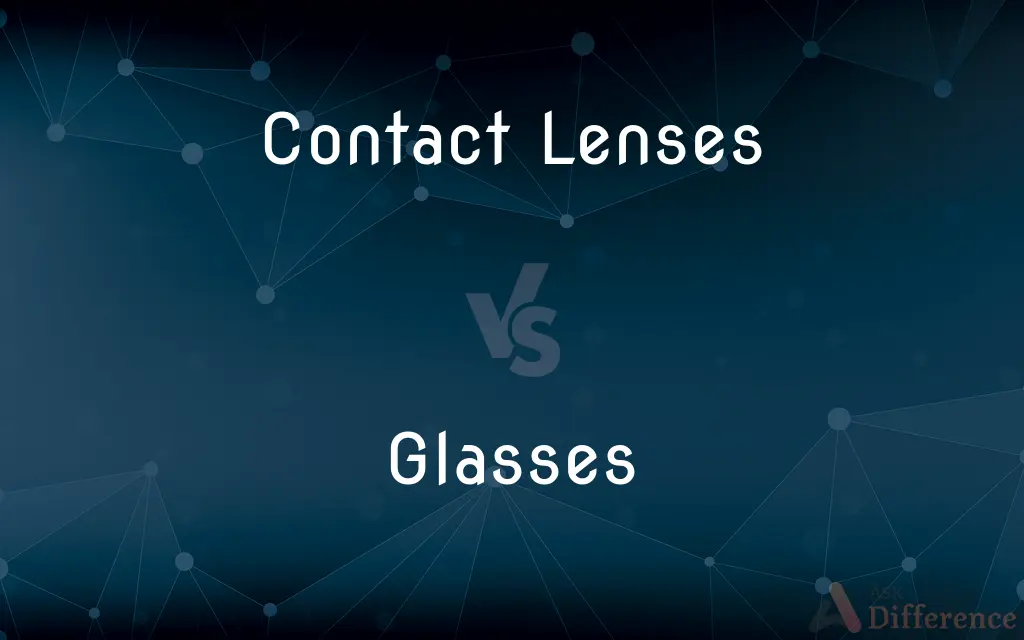Contact Lenses vs. Glasses — What's the Difference?
By Tayyaba Rehman — Published on January 11, 2024
Contact lenses are thin lenses placed directly on the eye's surface for vision correction, while glasses are eyewear with lenses set in frames worn over the eyes.

Difference Between Contact Lenses and Glasses
Table of Contents
ADVERTISEMENT
Key Differences
Contact lenses are small, thin lenses placed directly on the surface of the eye. They are designed to correct refractive errors by focusing light directly onto the retina. Glasses, alternatively, are a form of eyewear consisting of lenses mounted in a frame that sits on the bridge of the nose and hooks over the ears. They correct vision by focusing light before it enters the eye.
In terms of aesthetics and lifestyle, contact lenses offer a more natural appearance and do not alter one's look as glasses might. They allow for a wider field of unobstructed vision and are not affected by weather conditions like fogging or rain. Glasses, however, can be a fashion statement and are often chosen for stylistic reasons. They can be easier to put on and take off and don't require as much maintenance as contact lenses.
Contact lenses require strict hygiene practices to avoid eye infections, and their use involves a routine of cleaning and storage. They can also be more challenging to handle and require getting used to. Glasses are generally more user-friendly, especially for those with sensitive eyes or who are prone to allergies. They require minimal maintenance, typically just cleaning the lenses as needed.
For physical activities and sports, contact lenses are often more practical as they don't move around or fall off like glasses can. However, wearing contacts requires a consistent replacement schedule, and they can be more expensive over time, especially disposables. Glasses can be more cost-effective in the long run and don't have a risk of causing eye irritation due to prolonged use.
Prescription strength may also influence the choice between the two. For those with very high prescriptions, glasses lenses can be thick and heavy, making contact lenses a more comfortable option. Conversely, people with dry or sensitive eyes might find glasses to be a better alternative.
ADVERTISEMENT
Comparison Chart
Placement
Directly on the eye's surface
In front of the eyes in a frame
Field of Vision
Wide, unobstructed view
Limited by frame size
Maintenance
High: regular cleaning, storage
Low: occasional cleaning
Weather Conditions
Not affected by fogging or rain
Can fog up, get wet
Suitability for Sports
Ideal for physical activities
Prone to movement or falling off
Compare with Definitions
Contact Lenses
Hygiene Importance: Requires strict hygiene.
I clean my contact lenses daily to avoid eye infections.
Glasses
Frame-Mounted Lenses: Lenses set in a frame.
She chose glasses with a stylish frame to correct her vision.
Contact Lenses
Eye Surface Placement: Placed directly on the eye.
Contact lenses offer clear vision without altering appearance.
Glasses
Practical for High Prescriptions: Suitable for strong prescriptions.
Her high prescription necessitated thick glasses lenses.
Contact Lenses
Regular Replacement Needed: Need consistent replacement.
He uses disposable contact lenses that he changes monthly.
Glasses
Minimal Maintenance: Require less maintenance.
Cleaning her glasses lenses is quick and easy.
Contact Lenses
Invisible Eye Correction: Provides unnoticeable vision correction.
Contact lenses are great because they're almost invisible.
Glasses
Ease of Use: Simple to put on and take off.
Glasses are convenient for reading and computer work.
Contact Lenses
Corrects Refractive Errors: Used for vision correction.
She switched to contact lenses for better sports performance.
Glasses
Fashion Accessory: Can be a style statement.
His glasses add a sophisticated touch to his look.
Glasses
Any of a large class of materials with highly variable mechanical and optical properties that solidify from the molten state without crystallization, are typically made by silicates fusing with boric oxide, aluminum oxide, or phosphorus pentoxide, are generally hard, brittle, and transparent or translucent, and are considered to be supercooled liquids rather than true solids.
Glasses
A drinking vessel.
Glasses
A mirror.
Glasses
A barometer.
Glasses
A window or windowpane.
Glasses
The series of transparent plastic sheets that are secured vertically above the boards in many ice rinks.
Glasses
Glasses A pair of lenses mounted in a light frame, used to correct faulty vision or protect the eyes.
Glasses
Often glasses A binocular or field glass.
Glasses
A device, such as a monocle or spyglass, containing a lens or lenses and used as an aid to vision.
Glasses
The quantity contained by a drinking vessel; a glassful.
Glasses
Objects made of glass; glassware.
Glasses
Made or consisting of glass.
Glasses
Fitted with panes of glass; glazed.
Glasses
To enclose or encase with glass.
Glasses
To put into a glass container.
Glasses
To provide with glass or glass parts.
Glasses
To make glassy; glaze.
Glasses
To see reflected, as in a mirror.
Glasses
To reflect.
Glasses
To scan (a tract of land or forest, for example) with an optical instrument.
Glasses
To become glassy.
Glasses
To use an optical instrument, as in looking for game.
Glasses
Plural of glass
Glasses
Spectacles, frames bearing two lenses worn in front of the eyes.
Glasses
Field glasses; binoculars.
Glasses
Same as eyeglasses. See eyeglass{1}.
Glasses
Optical instrument consisting of a pair of lenses for correcting defective vision
Common Curiosities
Which is better for sports, contact lenses or glasses?
Contact lenses are generally better for sports due to their stability and wide field of vision.
How long can contact lenses be worn in a day?
It depends on the lens type, but usually around 8-12 hours.
Can glasses be worn with contact lenses?
Yes, glasses can be worn over contact lenses for additional vision correction or protection.
Are contact lenses safe to wear every day?
Yes, with proper hygiene and care, they are safe for daily use.
Do glasses alter peripheral vision?
Yes, the frames can limit peripheral vision to some extent.
Are daily disposable contacts a good option?
They are convenient and hygienic but can be more expensive.
How often should glasses be replaced?
Typically every 2-3 years, or as prescription changes.
Can contact lenses get lost behind the eye?
No, it's physically impossible for lenses to get lost behind the eye.
Are there bifocal or multifocal contact lenses?
Yes, there are contact lenses designed with multiple focus areas.
Can glasses protect eyes from external elements?
Yes, glasses can offer some protection from wind, dust, and debris.
Are glasses or contacts better for computer work?
Both can be suitable, but glasses can have coatings to reduce screen glare.
Do glasses or contacts offer better visual clarity?
This can vary, but contacts often provide more natural all-around vision.
Is it difficult to adjust to wearing contact lenses?
There can be an adjustment period, but most people adapt quickly.
Can children wear contact lenses?
Yes, with proper guidance and supervision.
Can dry eyes affect contact lens comfort?
Yes, dry eyes can make wearing contacts less comfortable.
Share Your Discovery

Previous Comparison
Stop-and-Wait Protocol vs. Sliding Window Protocol
Next Comparison
Cilia vs. FlagellaAuthor Spotlight
Written by
Tayyaba RehmanTayyaba Rehman is a distinguished writer, currently serving as a primary contributor to askdifference.com. As a researcher in semantics and etymology, Tayyaba's passion for the complexity of languages and their distinctions has found a perfect home on the platform. Tayyaba delves into the intricacies of language, distinguishing between commonly confused words and phrases, thereby providing clarity for readers worldwide.












































